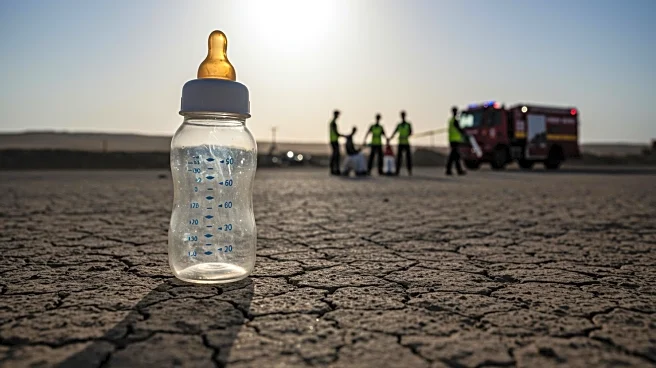What's Happening?
Doctors Without Borders has reported a significant increase in child malnutrition cases in Gaza, with 132,000 young children at risk of death from famine. The organization has highlighted the severe shortage of milk substitutes, forcing families to rely on natural herbs due to the lack of milk. The situation is described as a humanitarian catastrophe, with critically low supplies of fortified milk and special nutritious pastes exacerbating food shortages. According to the World Health Organization, deaths from malnutrition and starvation have spiked, with 133 deaths, including 25 children, reported in the first 20 days of August alone. Aid agencies and malnutrition experts have called for urgent action to address the crisis.
Why It's Important?
The malnutrition crisis in Gaza has significant implications for public health and humanitarian efforts in the region. The shortage of essential nutrition supplies threatens the lives of thousands of children and pregnant women, potentially leading to a long-term public health crisis. The situation also highlights the challenges faced by humanitarian organizations in delivering aid amidst logistical and security challenges. The crisis underscores the need for coordinated international efforts to ensure the consistent entry and distribution of life-saving nutrition supplies to prevent further deterioration of the situation.
What's Next?
The international community and humanitarian organizations are likely to increase pressure on relevant authorities to facilitate the entry and distribution of essential nutrition supplies in Gaza. The United Nations and other aid agencies may intensify their efforts to secure funding and resources to address the crisis. Additionally, there may be calls for increased transparency and accountability in the distribution of aid to ensure it reaches those in need. The situation may also prompt discussions on long-term solutions to address food insecurity and malnutrition in conflict-affected regions.
Beyond the Headlines
The crisis in Gaza raises ethical and humanitarian concerns about the impact of conflict on vulnerable populations, particularly children. It also highlights the need for sustainable solutions to address food insecurity and malnutrition in regions affected by conflict and political instability. The situation may prompt discussions on the role of international organizations and governments in providing humanitarian aid and addressing the root causes of food insecurity.










